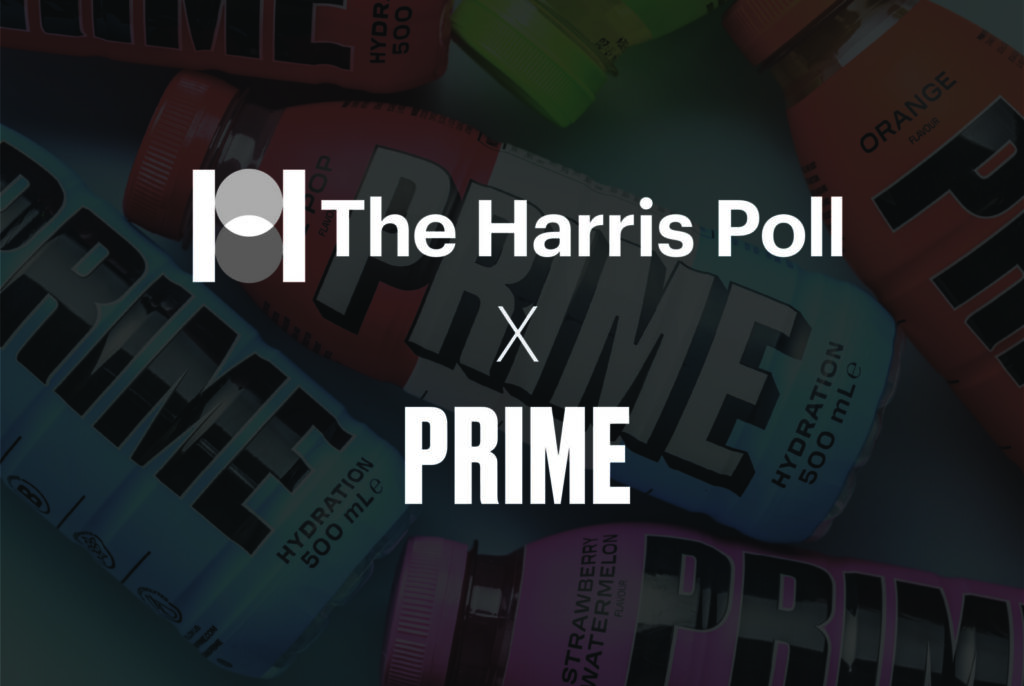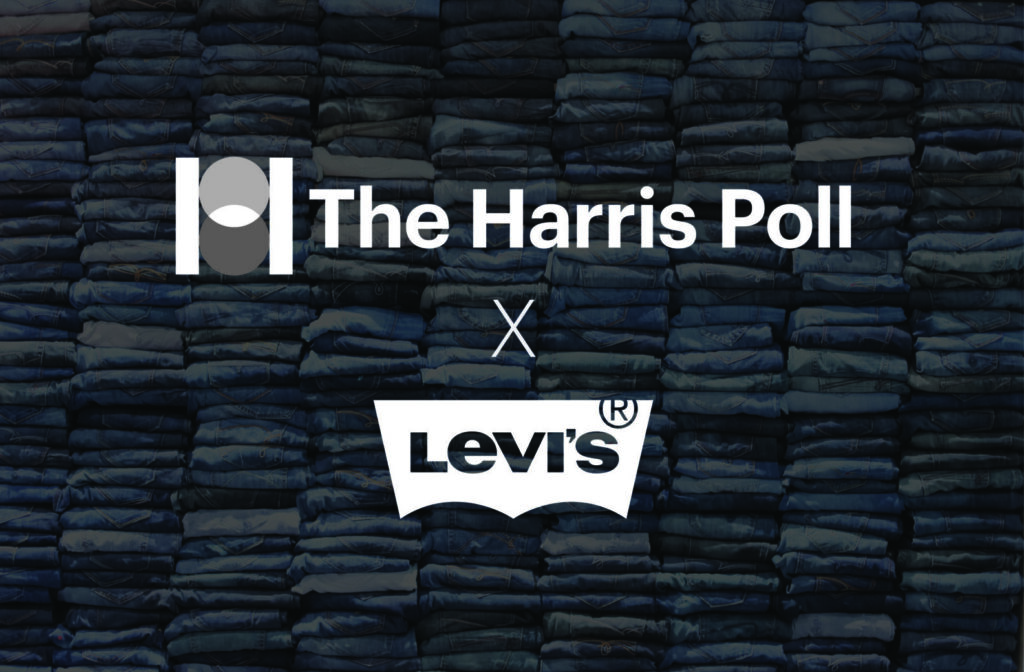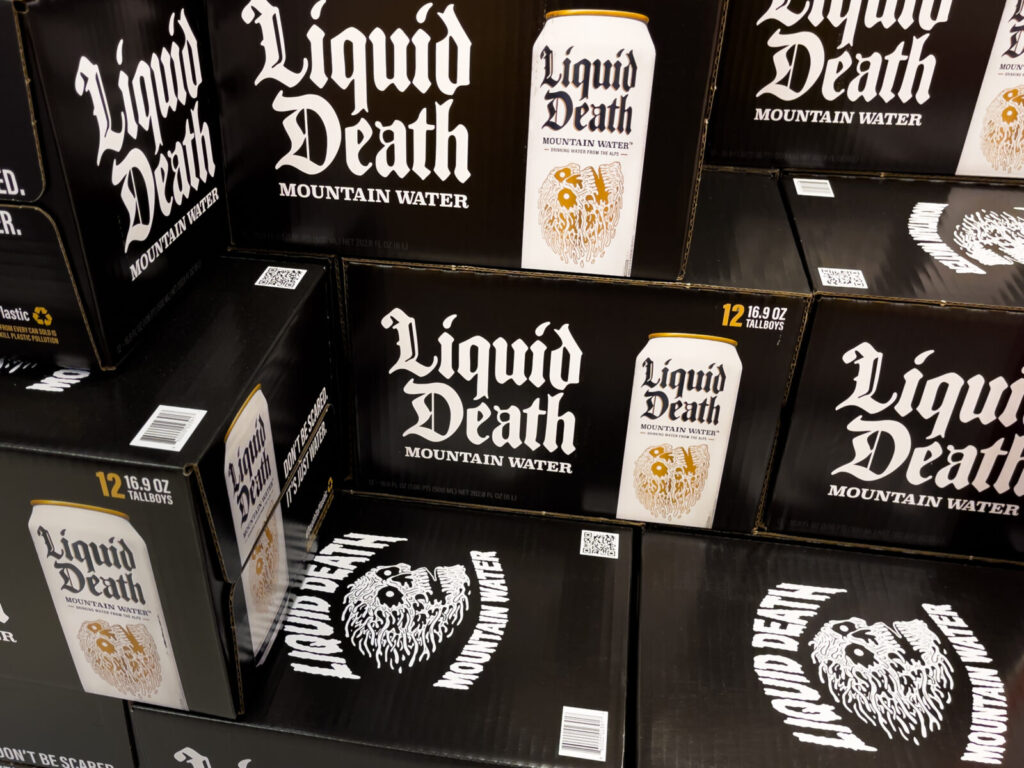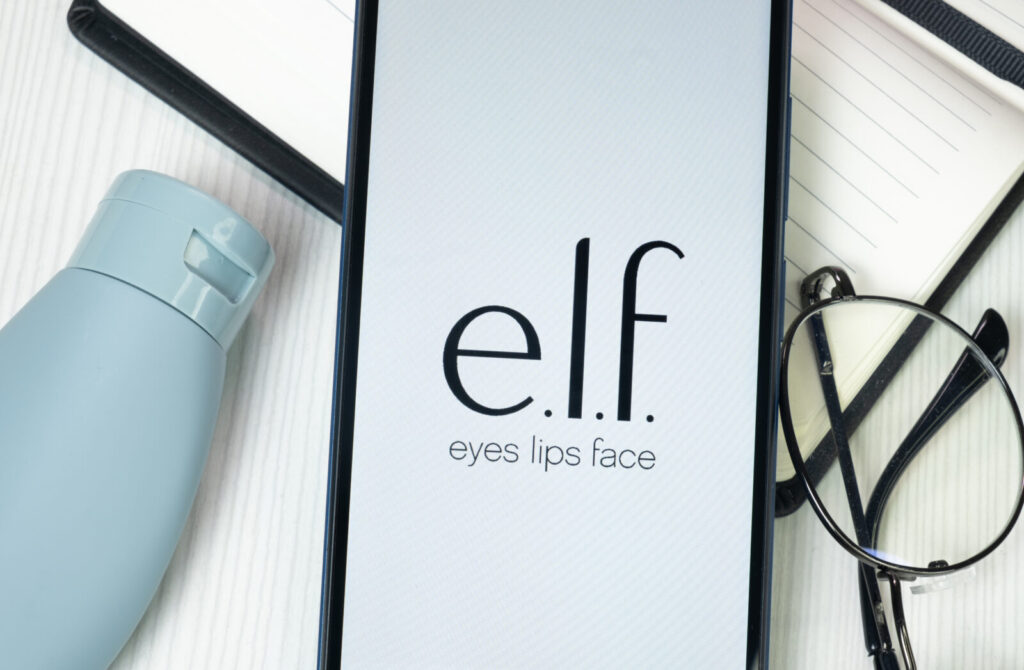Brief • 5 min Read
America This Week: University Leaders Under Fire, Money Regrets, Corporate Risk & Politics, and HR’s Job Gets Bigger
The latest trends in society and culture from The Harris Poll
Politics are in the air, and so is risk. Our CEO, John Gerzema, joined Stagwell’s Vice Chair Ray Day and Ethisphere to discuss the heightened business and reputational risk during the months leading up to the 2024 U.S. general election. Register here to view the presentation.

In our America This Week poll, fielded December 8th to 10th, among 2,031 Americans, the holidays are colliding with nearly three-quarters (74%) being worried about affording their living expenses and (43%) being very concerned (up from 68% in mid-November). Previously, we’ve seen holiday spending trump similar sentiment, but other Harris economic data on housing expenses, credit card rates, and others suggest belt-tightening is around the corner (if not in the next two weeks).
This week, four new surveys: First, in a new U.S. News-Harris Poll, we detail Americans’ diminished trust in higher education leaders over their prevarications on free speech. Next, we dive into the public’s financial regrets of 2023. After that, a new Harris Poll/HBR essay on corporate risk will make you think twice about wading into today’s divisive politics. To end, we found that most HR employees work outside their titles.
Americans Have Lost Faith In University Leaders: U.S. News & World Report-Harris Poll
In a new poll with U.S. News & World Report, Americans are experiencing a crisis of faith in college and university leaders amid a volatile moment for the higher education sector, with more than half not trusting them to do the right thing for students.
- Nearly (80%) of Americans we surveyed say that higher education institutions are more worried about their endowment than creating leaders of tomorrow.
- More than (60%) believe they prioritize donors, the press, and other external factors over students.
- Roughly (60%) reported that higher education leaders are failing students rather than developing them and that one of the barriers is that they themselves aren’t good examples of leaders.
- Another big problem: Nearly (80%) believe that if colleges and universities don’t become more accessible to all people and emphasize diversity, then the leaders of tomorrow will all be the same.
Takeaway: Americans have lost faith in university leaders over the examples they set, especially on issues like what constitutes free speech, which has been roiling university campuses over the past two months. “To students, donors, alumni, and the like, the one thing they can agree on here is that equivocation is not leadership,” says Harris Poll CEO John Gerzema.
This Year’s Money Regrets: NerdWallet-Harris Poll
It’s almost that time when everyone resolves to do better and achieve more in the coming year. A new Harris survey with NerdWallet suggests that some people may be fueling their New Year resolutions from their financial miscues of 2023.
- About two-thirds (67%) of Americans have financial regrets for 2023, with most saying they didn’t save enough for financial goals or emergencies (23%, 21%) and overspent on entertainment (22%).
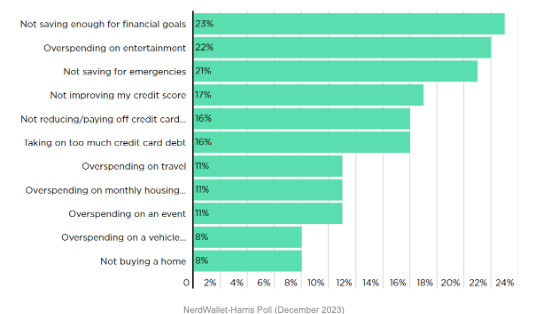
- But, looking forward in optimism: Three-fourths (75%) of that group say those regrets will lead to new resolutions in 2024.
- Lest 2023 sounds like nothing more than money woes: More than 3 in 5 (62%) Americans reported achieving some financial goals they set out to reach in 2023.
Takeaway: If you have financial regrets, you’re in good company. And if you hope to turn them into successes in 2024, plenty of other Americans have the same plan. NerdWallet recommends learning from these financial lessons and focusing on emergency funds, setting a clear budget, and trying to get credit card balances under control.
Corporate Crises — and Reputational Recovery — Have Changed
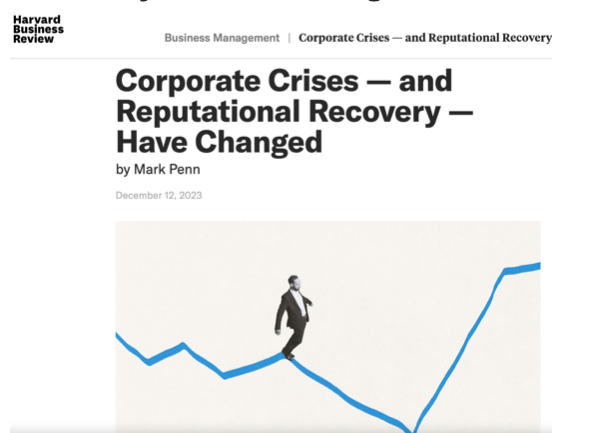
Stagwell CEO and Harris Poll Chairman Mark Penn has written a strong essay in Harvard Business Review on the potentially unresolvable reputational damage done when companies carelessly wade into today’s toxic political climate. The full piece is here below:
Historically, companies faced crises related to their products, services, or governance. Think Boeing and 737 Max crashes, Chipotle and burritos contaminated with E. coli, and Wells Fargo creating millions of fake bank accounts. And historically, these companies’ reputational recovery, as measured by the Harris Poll’s Reputation Quotient, followed a similar U-shaped pattern: Those companies that were able to refocus on their core competencies — like Boeing, Chipotle, and Wells Fargo — started rehabilitating their reputation within two to three years and experienced a full recovery within three to four years.
But in today’s polarized landscape in the U.S., a new type of corporate crisis is becoming more prevalent: the Crisis L. These L-shaped crises are more severe because they are driven by politics and culture wars, so the long tail of reputation damage is unknown. In such a polarized country, brands that face political backlash can alienate up to half their customer base. Their reputation score does not recover because support from one side has cratered. Those customers refuse to accept an apology because, to them, it is an issue of values, not of products.
Companies spark the Crisis L when they activate consumers’ political brains and make them think they are casting votes when purchasing. Of course, some companies, like Patagonia or Chick-fil-A, build their politics into their brand identity. But in today’s heightened partisan landscape, brands like Disney and Target have been surprised to find themselves in the middle of the culture wars. When this happens, brands that normally enjoy 80% public support will struggle with 50% support because their customers have their political brains on. Since facing off against Florida governor Ron DeSantis over the past two years, Disney has dropped from #37 on the Axios Harris 100 of top brands to #77. It is now one of the most politically polarizing brands on the list, with a 19-point gap in favorability between Democrats and Republicans. Companies need to keep consumers using their consumer brain — the side that evaluates products and services based on quality.
So how can companies avoid activating the political brain and spiraling into a Crisis L? Here are five things brands need to do to minimize the risk of crisis — and if backlash does arise, how they can follow the Crisis U shape to recovery rather than the Crisis L.
Know your customer.
According to the Harris Poll, two-thirds of Americans say they care more about a company’s products and services than values. But the nuances will depend on the company’s consumer base.
All-American brands with strong Boomer appeal will likely face backlash if they try to expand their base too quickly. This happened to Gillette when it released a #MeToo-era ad criticizing toxic masculinity by portraying boorish men grilling barbecue and harassing women. The ad won praise on progressive social media, but alienated Gillette’s core customers, who felt their lifestyle and identity were being unfairly attacked.
On the other hand, companies geared towards younger consumers may find themselves punished for not staking out social positions strongly. Starbucks found itself in national controversy for not responding quickly after its employees were accused of racial bias and calling the police on Black male customers.
In today’s climate, knowing your customer requires understanding their views in relation to your other stakeholders, especially employees. I’ve always been fascinated by Ford Motor Company, which has employees organized by a progressive union, while their most important product is the F-150, which draws a very rural and conservative base. Ford does a careful dance to avoid being caught between employees, management, and customers. It sticks to product quality as the primary message, even for its electric vehicle marketing, which emphasizes cutting-edge technology and race car-like driving. Ford is marketing a Mustang more than a Prius, which is consistent with the company’s understanding of its primary customers.
Brands must take the temperature of their customers on these wedge issues to avoid being blindsided when an action that is popular with its marketing department ends up ruffling feathers with its consumers, or vice versa.
Bring people together.
Not all social action has to be controversial. For example, McDonald’s decades-long partnership with the Ronald McDonald House to take care of families with sick children has become an easily recognizable part of the chain’s family-friendly brand. Everyone can talk about their values but one way to differentiate yourself and make a difference is focusing on unifying social messages and programs around things like helping kids read, extending broadband to rural areas, or finding cures to rare diseases.
Back it up.
Eighty-four percent of Americans say companies need a track record of acting on their values to be taken seriously, according to Harris Poll data. That is why Patagonia and Chick-fil-A are in the top 5 brands on the 2023 Axios Harris 100 even though they are among the most politically vocal brands.
A proven track record also helps to quell backlash when news moves quickly. Chick-fil-A recently faced conservative outrage over its diversity efforts, with its vice president of DEI singled out somewhat bizarrely after three years already in the job — but the uproar fizzled out quickly. “Chick-fil-A going woke” just did not sound credible to most people when the company has built such a strong identity.
Don’t flip-flop.
Refuse to backtrack on social stances when facing backlash. Consumers value consistency and they are suspicious about fake sincerity which is only confirmed when companies quickly flip flop based on political pressure. Seventy-seven percent think most companies’ apologies for controversy are insincere, according to Harris Poll data; and if indeed you’re not, why back down on your values? Nike rode out the Colin Kaepernick backlash by standing behind their sponsorship and social platform. Eventually, people got the message and most of them also got over the controversy. Compare to Target this year, which quickly scaled back its Pride Month merchandise after facing criticism and thus alienated everyone — both the original protestors and then the pro-LGBTQ community that didn’t want it to back down.
Get advice from both sides.
Companies often don’t have teams skilled on wedge political issues and even if they do it’s usually a team from one party. Bringing both Democratic and Republican experts to the table is the best way for brands to avoid angering one side and dropping to 50-50 favorability. Better yet if the brands also integrate financial communications and public opinion experts to supplement their education.
Microsoft was one of the first big companies to have a controversy in the modern communications era — around antitrust — and it was successful at managing the crisis U with a comprehensive defense strategy about the “freedom to innovate” and a campaign that repositioned the company around empowering consumers. After initially weathering this antitrust crisis, Microsoft hired an advisory board drawing on experts who understood the Democratic and Republican side of major issues and met quarterly with top executives. This team made sure the company got ahead of issues instead of reacting too late. Today, while other tech companies are facing difficult situations, Microsoft floats above most of the controversies.
In the past few years, many companies were taken in by polling that asked whether consumers wanted companies to be socially responsible. Of course they said yes — they want everyone to be socially responsible. But when you ask consumers which is important between products and values, they overwhelmingly reveal that they want companies to prioritize explaining how their products are superior.
It’s unreasonable not to take any stances today but that doesn’t mean controversy and long-term reputation damage are inevitable. Companies have to be proactive with bipartisan advice and a ready defense; then if they find themselves in a crisis, they can react by sticking to their values and showing their track record. In such a polarized landscape with even more flashpoints leading up to the 2024 election, the danger of falling into a Crisis L is higher than ever but there is a clear path to the Crisis U as well.
For HR The Title Isn’t The Real Job: HR Brew-Harris Poll
In our latest work with HR Brew, most Human Resources (HR) professionals must be more open to their job title and actual work.
- Almost seven in ten HR pros (69%) agreed that their current title doesn’t reflect their work–a sentiment stretched across HR levels.
- At the same time, most HRPs are being asked to perform tasks outside the scope of their role.
- This is causing stress and discouragement: more than one-half (57%) are also seeking to leave the profession shortly.
- One solution? Salary increases: (57%) believed they’d need to switch companies to achieve a significant raise.
- Another solution would be implementing more training and development: Nearly eight in ten (78%) agree that their company could provide them with more of these opportunities.
Takeaway: Though HR departments are juggling myriad challenges, it’s worth considering how employees might react before adding more to their plates. The proliferation of responsibilities assigned to HR employees may lead to a mismatch between work expectations and work execution – a cause for concern with retention.
Subscribe for more Insights
Subscribe to our newsletter for the latest trends in business, politics, culture, and more.
Download the Data
This survey was conducted online within the U.S. by The Harris Poll from December 8th to 10th, among a nationally representative sample of 2,031 U.S. adults.
Download
Subscribe for more Insights
Subscribe to our newsletter for the latest trends in business, politics, culture, and more.
Download the Data
This survey was conducted online within the U.S. by The Harris Poll from December 8th to 10th, among a nationally representative sample of 2,031 U.S. adults.
DownloadRelated Content

